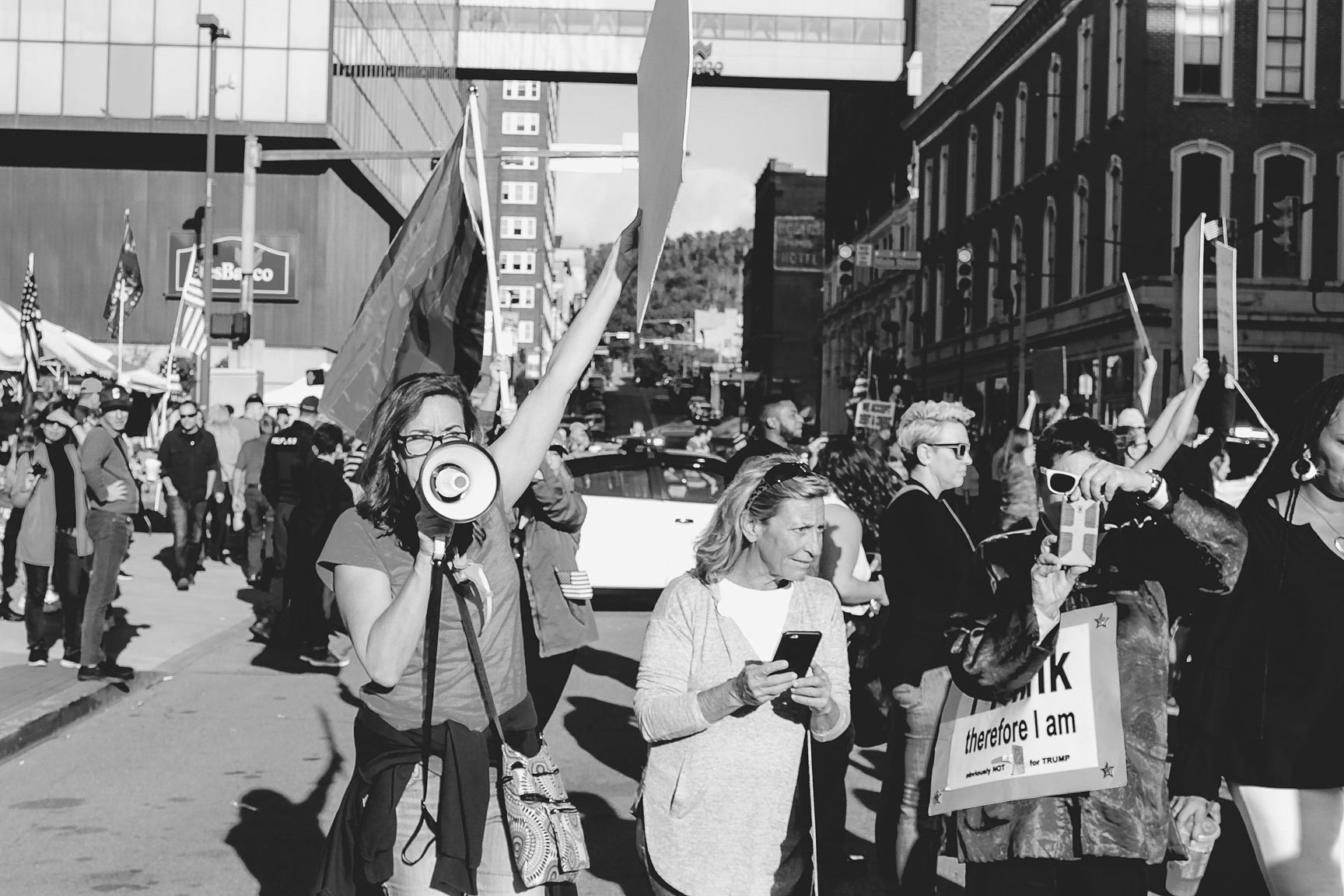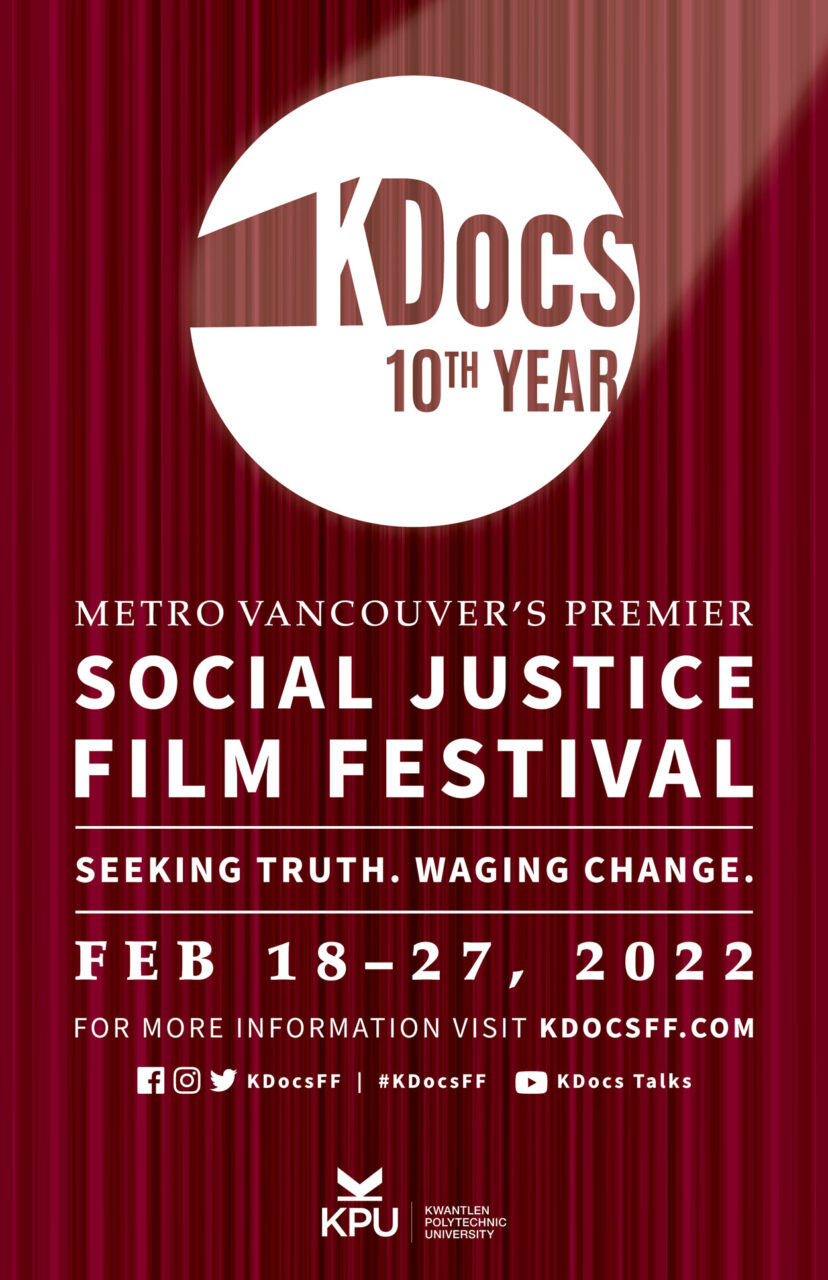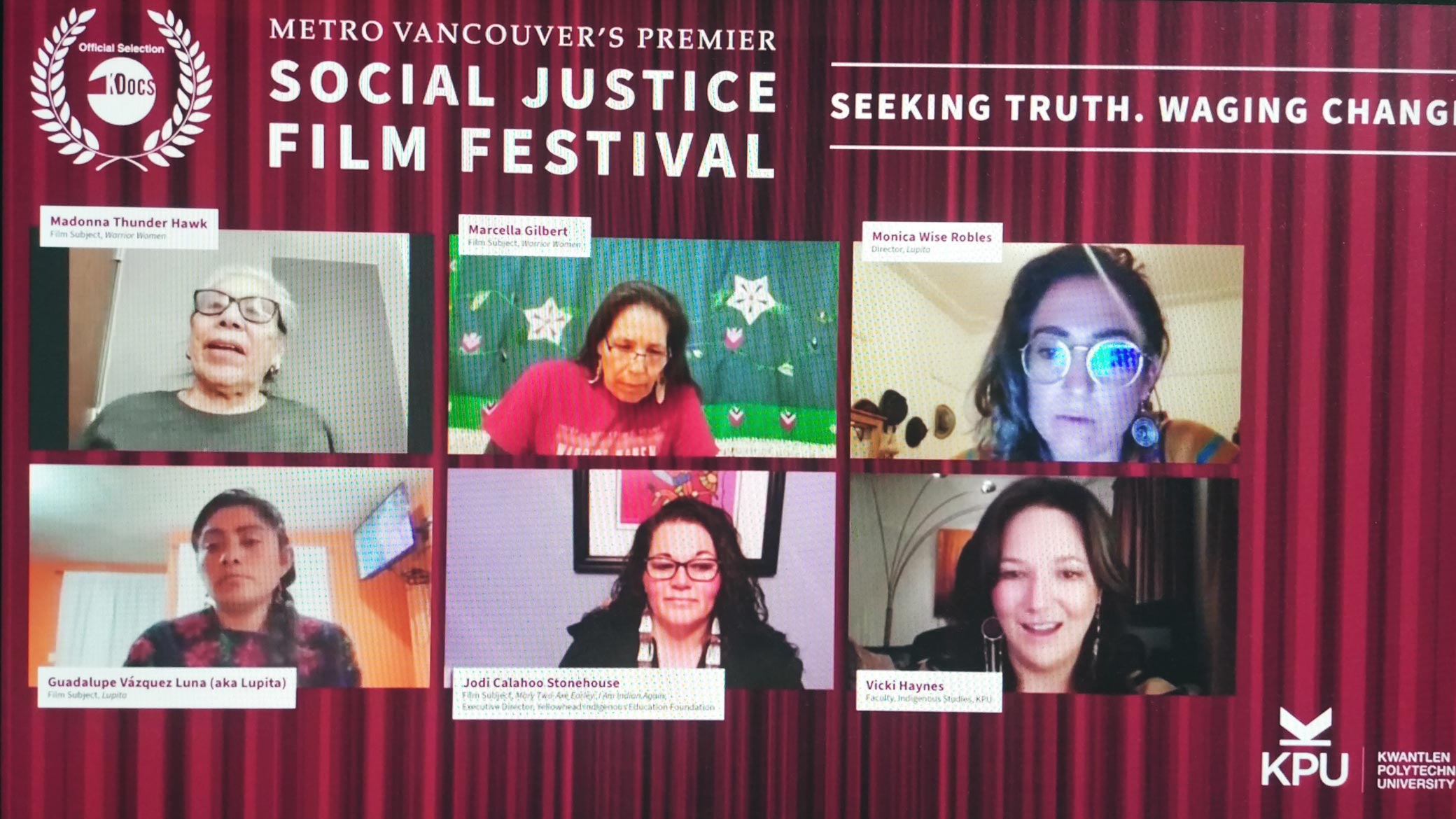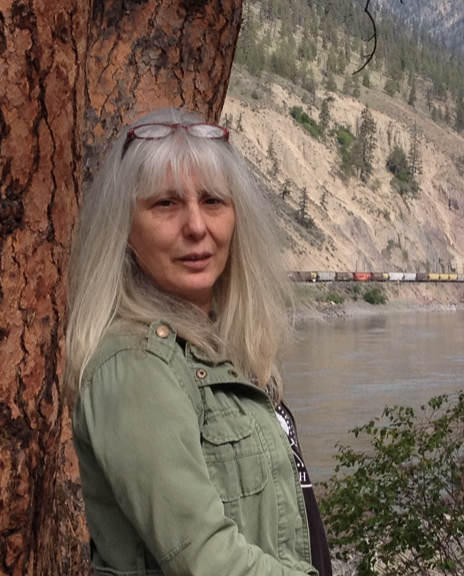
2022 FestivalSEEKING TRUTH. Waging Change.
POSTER

In the pursuit of enlightenment and societal transformation.
KDocsFF held its eighth annual documentary film festival on February 18-27, 2022, fully online for the second time (due to Covid19 and restrictions on in-person festivals), with 21 award-winning documentary films, as well as 18 keynote addresses, 4 panel discussions/Q&As, and 1346 ticketed guests (2580 guests in total)!
Courtesy of Kwantlen’s Library, you can read a bibliographic listing of additional resources for the KDocsFF 2022 films.
OUR FILMS 2022 Films
In Seattle, Washington, the county government pilots a paradigm-shifting restorative justice program with the goal of keeping youths out of prison, bringing healing to disenfranchised families and communities, and reforming our dysfunctional justice system. With animation, the film tracks a Mexican-American youth facing four felony charges as he struggles through the program, shepherded by a former Cambodian gang leader. With live-action, the film flashes back to the indigenous origins of peacemaking circles in the Yukon and tracks the winding trajectory that brought the ancient practice from the past to the present.
Two Oakland artists, Pancho Peskador, a Chilean studio painter, and Desi Mundo, a Chicago-born aerosol artist, form an unlikely partnership to tackle their most ambitious project to date, a four-story mural in the heart of downtown Oakland.
Their site is situated at a unique intersection where Chinese and Afro-Diasporic communities face the imminent threat of displacement and gentrification. Prior to painting, the mural faces numerous obstacles: complex negotiations with profit-minded property owners, satisfying a community of diverse residents, and resolving the artists’ own aesthetic conflicts. As the mural takes shape on the wall, Oakland’s unique cultural legacies come to life through historical flashbacks. Past exclusionary policies replay themselves in the present as gentrification threatens to uproot long-term residents. The mural is fraught with its own challenges. Nonetheless, Desi and Pancho conclude the mural with great fanfare and a vibrant celebration.
Three months later, news comes that another forthcoming condominium development will obscure the mural, which has become a source of neighborhood pride. Despite last-ditch opposition to the condominium, it receives city approval, effectively dooming the mural. Meanwhile, the city unveils its urban planning process for the downtown district. Ultimately displaced, the mural becomes a spark for the community to rally to protect cultural arts and coalescing the community resistance to gentrification.
All Light, Everywhere is an exploration of the shared histories of cameras, weapons, policing and justice. As surveillance technologies become a fixture in everyday life, the film interrogates the complexity of an objective point of view, probing the biases inherent in both human perception and the lens.
Factory workers diligently parse fabrics and prepare plastic products—like water bottles and binoculars—in clusters and in an assembly line. Men weld metal cylinders with precision, and a networking conference devotes its attention to training a predominantly female audience how to excel in business etiquette. These and many other absorbing vignettes are what make up the central focus of Jessica Kingdon’s Ascension: an exploration of contemporary China’s identity as it relates to its vision of consumerism, innovation, and social standing. Kingdon’s rich and unobtrusive access into these arenas captures revealing moments with impressive patience and restraint—but also with surprising moments of humor. The film’s curious and observational lens delivers a hypnotic quality in its visuals, immersing the viewer in the stark differences between social classes, and how the struggles of the working class are laid bare in trying to realize the “Chinese Dream.” Implementing a large-scale visual canvas, Kingdon scrutinizes China’s imposing standing as a global superpower and embeds the viewer in the work ethic and lifestyle of its citizens—showcasing their collective pursuit of success through hard labor and material wealth.
Tracey Cochrane’s Dead Boy deals with the issues of drug overdose where unintentional deaths occur leaving families shattered over the loss of a family member, mostly a young person. The documentary reveals how the members of the family mostly parents deal with the sudden deaths of their loved ones where they work for the community and reach out to members undergoing similar pain and create awareness against the deadly issue. Some of them find solace in the Almighty. Tracey has proven herself as a well-trained director who could easily handle fiction even though Dead Boy is a documentary. There are some breathtaking drone shots of the river, forest, and snows which are a visual treat and gives a relief to the viewer from the hard subject she brings alive. Tracey truly deserves the accolades she has received for the film.
Food for the Rest of Us will examine how getting back to the land is tied to other movements such as Black Lives Matter, Idle No More and Times Up. Food for the Rest of Us is a feature film that presents 4 stories of people living life on their own terms, serving as leaders and role models who are lending their voice to the underdog and leading a revolution to a better world, from the ground up! An Indigenous-owned, youth run organic farm in Hawaii, and Black urban grower in Kansas City who runs a land-farm at East High School, A female Kosher Butcher in Colorado working with the Queer Community and an Inuit community on the Arctic Coast who are adapting to climate change with a community garden in a small geodesic dome.
As Canadians, we often take pride in our international reputation as peacekeepers and defenders of democracy. But there is a dark side to our foreign policy — a policy that has thwarted the Haitian people’s struggles for freedom and self-determination over the last two decades. In 1986, Haitians joined their voices together in a cry for a new kind of society. Emerging from years of brutal dictatorship, they dreamed of a democracy that would serve the poor, listen to their voices and bring an end to impunity. And between 1991 and 2004, Haitians managed, against all odds, to elect a succession of governments committed to realizing this dream. The pro-democracy movement’s efforts, however, were ultimately derailed by powerful local elites and their allies in the international community. Haiti Betrayed reveals how Canada, once seen by Haitians as a constructive partner, conspired with the United States and France in 2003 to topple the democratically-elected government. Seven years in the making, Elaine Brière’s film meticulously reconstructs Canada’s role in the events that culminated in the United Nations-sanctioned coup d’état on February 29, 2004 and the bloody aftermath that followed. Haiti Betrayed is a searing indictment of Canadian leaders’ complicity in the international oppression of this long-suffering nation. With the country in the throes of a new popular uprising against corruption and authoritarianism, Brière’s film shows that the roots of current crisis can be found in the coup d’état backed by Canada fifteen years ago.
In the wake of recent news stories announcing the targeted assassination of female media workers in Afghanistan, In the Rumbling Belly of Motherland provides a sharp look into Zan TV, Kabul’s female-operated, female-oriented news agency. Filmmaker Brishkay Ahmed, herself a trained journalist with credits from Langara College and Simon Fraser University, returns to Afghanistan to document this simultaneously harrowing and inspiring work environment. The film’s intimate cinematography deftly yet quietly reveals the daily, sometimes deadly hurdles faced by Afghan reporters and media staff. Following parallel news stories as they unfold—two sets of national elections as well as ongoing US-Taliban peace talks—the film pulls us into the Afghan political climate and highlights the existential current events that threaten both Zan TV as a media outlet and the livelihoods of the women at its heart.
Often called the “Canadian Bernie Sanders,” Jean has the credibility and integrity forged through a decades-long career fighting the systems that keep people entrenched in poverty. Now that she is in her first elected role as a city councillor, it’s been fascinating to watch Jean navigate creating change from inside government, while also working alongside the next generation of activists. Jean Swanson: We Need A New Map features Jean candidly reflecting on the highs and lows of her forty-year career of activism, and what it means to dedicate your life to effecting change.
Elle–Máijá Tailfeathers’ film witnesses radical and profound change in her community. Kímmapiiyipitssini: The Meaning of Empathy is an intimate portrait of survival, love and the collective work of healing in the Kainai First Nation in Southern Alberta, a Blackfoot community facing the impacts of substance use and a drug-poisoning epidemic. Community members active in addiction and recovery, first responders and medical professionals implement harm reduction to save lives. This work is contextualized within the historical and contemporary impacts of settler colonialism; Kímmapiiyipitssini: The Meaning of Empathy draws a connecting line between the effects of colonial violence on Blackfoot land and people and the ongoing substance-use crisis. Held in love and hope for the future, Kímmapiiyipitssini: The Meaning of Empathy asks the audience to be a part of this remarkable change with the community.
In a country where indigenous people are increasingly displaced, their land stolen, where students disappear without trace following police arrest, and journalists are murdered at an alarming rate, a courageous new voice emerges: Lupita, a Tsostil Maya massacre survivor, at the forefront of a new movement of indigenous women. If anyone can change the conscience of Mexico, it is Lupita, confronting corrupt militaries, mobilizing her pueblo’s resistance, and cultivating a new generation of organized and vocal Maya activists. The film intimately follows Lupita taking on risks and responsibility to represent her people, weaving her personal narrative into the painful revolutionary history of Mexico. Part lyrical testimony, part vérité storytelling, part tribute to 500 years of indigenous resistance, this film mediates the point-of-view of a brave woman who must balance the demands of motherhood with her high stakes choices to reeducate and restore justice to the world.
Mary Two-Axe Earley: I Am Indian Again shares the powerful story of Mary Two-Axe Earley, who fought for more than two decades to challenge sex discrimination against First Nations women embedded in Canada’s Indian Act and became a key figure in Canada’s women’s rights movement. Using never-before-seen archival footage and audio recordings, Mohawk filmmaker Courtney Montour engages in a deeply personal conversation with the late Mohawk woman who challenged sexist and genocidal government policies that stripped First Nations women and children of their Indian status when they married non-Indian men. Montour speaks with Cree activist Nellie Carlson, Mary’s lifelong friend and co-founder of Indian Rights for Indian Women, and meets with three generations in Mary’s kitchen in Kahnawà:ke to honour the legacy of a woman who galvanized a national network of allies to help restore Indian status to thousands of First Nations women and children.
Three fearless community organizers with a history of standing up against big tech corporations, embark on an uphill political fight to regulate Uber and Lyft in Toronto so that these companies operate in the public interest, respecting communities, drivers and passengers.
In the 1960s, the hippies championed the idea of a sexual revolution. They received neither Fatwas nor bodyguards. Today, Seyran Ateş – a Turkish- German lawyer, feminist, and one of the first female imams in Europe – is fighting for a sexual revolution within Islam. In return, she was shot, received fatwas and death threats, and now has to live under constant police protection. Seyran believes the only way to fight against radical Islam is through Islam, which is why, in her liberal mosque, there is no gender segregation or exclusion based on sexual orientation. This is the story of Seyran’s personal and ideological fight for the modernization of Islam. Her quest for change takes her on a journey around the world, meeting with different people connected through faith, from sex workers in a German brothel to Uyghur LGBTQ youth and traditional female imams in China. It is also a journey through Seyran’s life, from her humble beginnings as a Muslim girl in Turkey’s slums to a female leader daring to challenge her own religion. Seyran rebels against extremism and hate in the name of peace and love.
In Sean Horlor and Steve J. Adams’ feature doc Someone Like Me, Drake, a young gay man from Uganda, leaves behind everything he knows to attain the universal freedoms everyone deserves: to be who he is and love whomever he chooses without fear of discrimination, persecution, or violence. A group of queer strangers unite to resettle Drake in Vancouver, but they are tasked with a year-long commitment to someone they’ve never met, and struggle with the challenging conditions of this support. Together, Drake and his sponsors embark on an emotional journey in search of personal freedom, revealing how in a world where one must constantly fight for the right to exist, survival itself becomes a victory.
Anita Chitaya has a gift; she can help bring abundant food from dead soil, she can make men fight for gender equality, and she can end child hunger in her village. Now, to save her home from extreme weather, she faces her greatest challenge: persuading Americans that climate change is real. Traveling from Malawi to California to the White House, she meets climate sceptics and despairing farmers. Her journey takes her across all the divisions shaping the US, from the rural-urban divide, to schisms of race, class and gender, to the thinking that allows Americans to believe we live on a different planet from everyone else. It will take all her skill and experience to persuade us that we’re all in this together. This documentary, ten years in the making, weaves together the most urgent themes of our times: climate change, gender and racial inequality, the gaps between the rich and the poor, and the ideas that groups around the world have generated in order to save the planet.
A very human tech doc, The Gig Is Up uncovers the real costs of the platform economy through the lives of people working for companies around the world, including Uber, Amazon and Deliveroo. From delivering food and driving ride shares to tagging images for AI, millions of people around the world are finding work task by task online. The gig economy is worth over 5 trillion USD globally, and growing. And yet the stories of the workers behind this tech revolution have gone largely neglected. Who are the people in this shadow workforce? The Gig Is Up brings their stories into the light. Lured by the promise of flexible work hours, independence, and control over time and money, workers from around the world have found a very different reality. Work conditions are often dangerous, pay often changes without notice, and workers can effectively be fired through deactivation or a bad rating. Through an engaging global cast of characters, The Gig Is Up reveals how the magic of technology we are being sold might not be magic at all.
In Jennifer Abbott’s cinematic journey, the Sundance award-winning Director (The Corporation) draws intimate parallels between the experiences of grief—both personal and planetary. Stories from the frontlines of climate change merge with recollections from the filmmaker’s childhood on Ontario’s Georgian Bay. What do these stories have in common? The answer, surprisingly, is everything. The film takes us around the world to witness a planet in crisis: from Australia’s catastrophic fires and dying Great Barrier Reef, to the island nation of Kiribati, drowned by rising sea levels. In Nunatsiavut, melting ice permanently alters the landscape, while in the Amazon rainforest, Indigenous people fight a desperate battle against oil and mining extraction. For the people featured, climate change is not happening in the distant future; it is kicking down the front door, flooding homes, poisoning water and destroying communities. The connection between humanity and the environment is stated plainly by Australia’s Wonnarua Traditional Custodians: “If this land hurts, we hurt.” Like ash from a distant fire, grief on this scale touches everything. But coming to terms with the brutal reality of climate breakdown requires more than empty words and gestures. When hope is lost, the real work begins. Members of Extinction Rebellion protest in the streets, risking arrest. Greta Thunberg’s school strike grows from a solitary vigil to a mass movement. The Sápara, Wonnarua and Nunatsiavut land defenders hold the line in a life and death struggle. Facing her own mortality, Jennifer’s sister offers another kind of answer: “Just a simple, quiet openness to all that is.” Battles waged, lamentations of loss, and raw testimony coalesce into an extraordinary tapestry, woven together with raw emotion and staggering beauty that transform darkness into light, grief into action.
Waging Change shines a spotlight on the challenges faced by restaurant workers trying to feed themselves and their families off tips by intertwining stories of individuals, such as Nataki Rhodes of Chicago, Andrea Velasquez of Detroit and Wardell Harvey of New Orleans with the growing movement to end the tipped minimum wage. Featuring Saru Jayaraman, Lily Tomlin, Jane Fonda and Rep. Alexandria Ocasio-Cortez, the film reveals an American workers’ struggle hidden in plain sight– the effort to end the federal tipped minimum wage of $2.13 for restaurant servers and bartenders and the #MeToo movement’s efforts to end sexual harassment. Directed by Peabody award winner, Abby Ginzberg, Waging Change helps all consumers see the important role they have to play in ending this two-tiered wage system.
American Indian Movement (AIM) fought for Native liberation and survival as a community of extended families. Warrior Women is the story of Madonna Thunder Hawk, one such AIM leader who shaped a kindred group of activists’ children – including her daughter Marcy – into the “We Will Remember” Survival School as a Native alternative to government-run education. Together, Madonna and Marcy fought for Native rights in an environment that made them more comrades than mother-daughter. Today, with Marcy now a mother herself, both are still at the forefront of Native issues, fighting against the environmental devastation of the Dakota Access Pipeline and for Indigenous cultural values. Through a circular Indigenous style of storytelling, this film explores what it means to navigate a movement and motherhood and how activist legacies are passed down and transformed from generation to generation in the context of colonizing government that meets Native resistance with violence.
We are unstoppable, another world is possible!” chant the Sustainabiliteens, a group of young environmental activists who, in 2019, organized the largest climate strike in Vancouver’s history. What about Our Future? chronicles the everyday lives of these youth leaders as they organize, mobilize and pressurize for climate justice.

2022 FILMSWant to watch panel talks and more content?

WORD ON THE STREET
KDocsFF is by far one of the best film festivals we have had the honor of attending.
It was online in 2022 due to Covid, but clearly, they love documentary films as much as the filmmaker and made KDocsFF 2022 a fantastic event. We were honoured to have our film Dead Boy featured, and we also loved the ongoing communication between us and festival organizers. KDocsFF works hard at their festival, and it shows. Our hats are off to you, Janice Morris, and team. Truly, a fantastic festival, showcasing real, tough issues and raising awareness. “Seeking truth” and “Waging Change,” for sure. As an independent filmmaker, I am self-funded, and it can be challenging trying to get the attention of the more prominent festivals. Thank you, KDocsFF, for the inclusion of our film. Enormous gratitude and love from northern BC.”
Tracey CochraneDirector, Dead Boy and Special Guest and Keynote Speaker, KDocsFF 2022
Shape Change with Us
How Can You Contribute?
Your involvement as a partner goes beyond mere support — it’s an opportunity to be at the forefront of driving social change through film. Join us in this transformative journey.
Why Partner with Us?
Your support fuels our mission, enabling us to bring you thought-provoking documentaries and engage wider communities in meaningful dialogues. Together, we can amplify the impact of social justice narratives.

